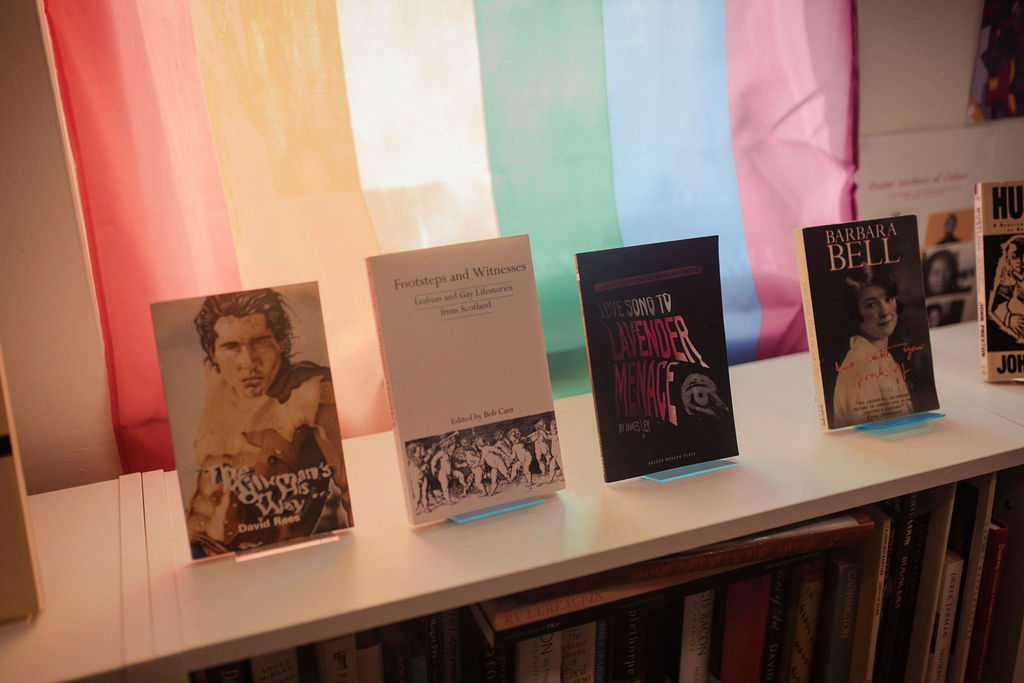The Lavender Menace Queer Books Archive (LMQBA) has a mission to develop a physical archive of queer and LGBT+ books. We are creating an interactive digital database of this collection for readers like you! Our goal is to complement this catalogue with reviews and a blog about queer and LGBT+ books, which will be available online as the project grows. Learn more about the organisation and its mission.
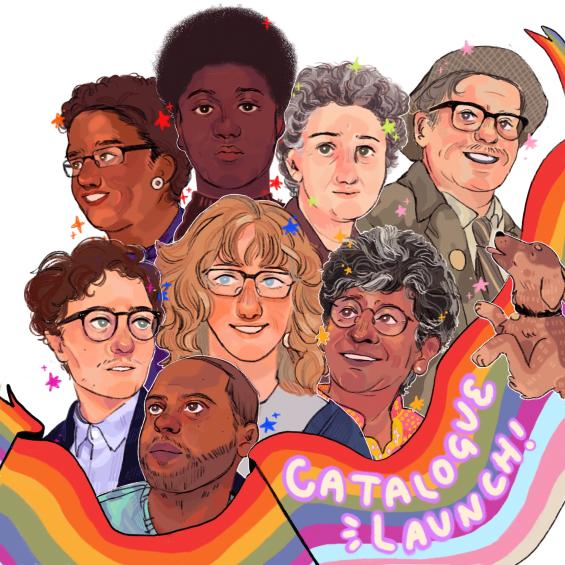
About the collection
The collection and this digital database focuses on physical books, especially those published between 1970 and 2000 and earlier, and which were sold in Scotland’s first lesbian and gay bookshops – Lavender Menace and later West & Wilde. It is our goal to keep them alive for readers in a way the publishing industry’s business model makes it difficult to do.
Since the inception of LMQBA, we have also expanded our accession focus to include works by underrepresented groups, authors of colour, and works and authors with a Scottish connection.
I am so proud of what we have achieved and hope this catalogue only continues to evolve and grow.
Eleanor (she/her)
Terminology
Although some of the works contained in this collection are historical in nature, LMQBA uses contemporary language and terminology for the purpose of improving the searchability of the database. The name Lavender Menace Queer Books Archive uses ‘queer’ to refer to the entire diversity of the lesbian, gay, bisexual, and transgender (LGBT) community, including non-binary, queer, intersex, asexual people, and all identities under the LGBTQIA+ umbrella. Similarly the database uses ‘trans’ in an inclusive way referring to a range of non-cis identities.
The presence of historical texts in the collection invites the potential for rhetorical violence in the texts themselves, as well as in the cataloguing and interpretation of those texts in the digital database. In our work, we make every effort to prioritise inclusive, contemporary language, though in some cases authors may not have identified with terms used in our database, either from a matter of taste or for the fact that contemporary terms did not exist in their timeline. For more contemporary authors and works, we catalogue using the author’s pronouns and preferred name where that information is available. If you are looking for particular authors, works, or themes and cannot find them in the database, please contact us using our web form.
Content notes
The books in our catalogue reflect the diversity of queer experience, ranging from groundbreaking publications in the advancement of gay liberation to histories of queerphobic bigotry and pathologisation. We recognise that everyone who accesses our resource should do so with as much information as possible regarding the contents of our books, and we are continually in the process of adding content notes to each book. This catalogue is a living document, and content notes will be updated on a continual basis. Due to limited capacity, not all of our books will have content notes yet. Our content notes will cover, not just potentially triggering subjects (e.g. transphobia), but also any details that we think readers may want to be aware of before engaging (e.g. surgery). If you would like a specific content note to be added to a book, don’t hesitate to contact us.
Add to our collection
We have a wishlist, which can be viewed online.
If you have any of these books and would like to donate it to the archive, we would greatly appreciate your contribution to this project. Please contact us via our web form to learn more about our accessions process.
Using the collection
You are welcome to browse the catalogue online at any time and to browse the shelves in person during our opening hours (Tuesday and Thursday 11am-4pm).
Not all of our books are on display, so if you find something in the online catalogue you particularly want to read, send us a message so we can set it aside before your visit.
Research enquiries
Please send research enquiries and appointment requests via our web form
We ask researchers to contact us in advance so we can prepare for your visit. Make sure you include ‘Research’ as the subject of your message and give us details of your interest or project. We are a volunteer-staffed archive so if you have a specific time-frame to which you are working, please let us know.
Supporting our work in progress
The digital catalogue you see today is not the final draft of this project. Both our collection, the database, and our interpretive resources will continue to grow and change as we refine our cataloguing process and receive more donations. If you have feedback about our approach or individual records in the database, we encourage you to contact us by using our web form. We are committed to responding to and learning from all respectful feedback, and we appreciate thoughtful contributions to our ever growing project. Thank you!
I hope that people will be as excited to use the catalogue as it was for me to be part of building it.
Tadeja (ona / they, them)
Personal perspectives on the catalogue
This digital database is a labour of love from dozens of volunteers who offered their time, energy, and expertise over the past several years to record LMQBA’s rapidly expanding collection. It feels right to share with you what they think about the project and why it matters to them. Some of their thoughts will appear as pull quotes throughout this article.
How to use the catalogue
You can preview the records in the catalogue in several ways:
- Browsing
- Searching
- Filtering
- Collections
The volunteers have prepared a video guide to using the catalogue. You can also scroll further down this page to see the details contained in this video in text and graphics.
Browsing
Books in our online catalogue are sorted alphabetically by title, by default. To browse alphabetically, click through the letters under the search bar and scroll down the page. Click any cover to see the record details.

You can also control how entries appear in the catalogue by switching between Title, Creator, Added, and Published. “Creator” refers to the last name of the first author or editor. The latter two options sort the catalogue by year; “Added” denotes when the book was catalogued, and “Published” the year of publication.
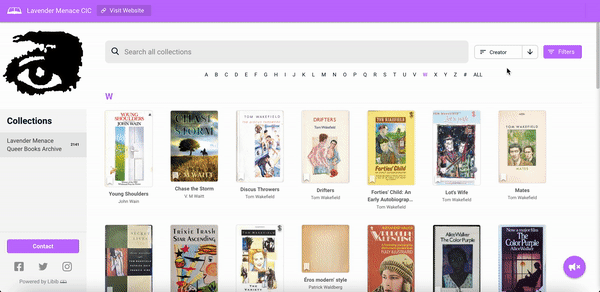
Searching
The search bar performs a keyword search over all book details, including the bibliographic information, tags, and notes added to each record. Type your search term into the search bar and click enter or return on your keyboard. Scroll down the page to preview the details of the returned records.
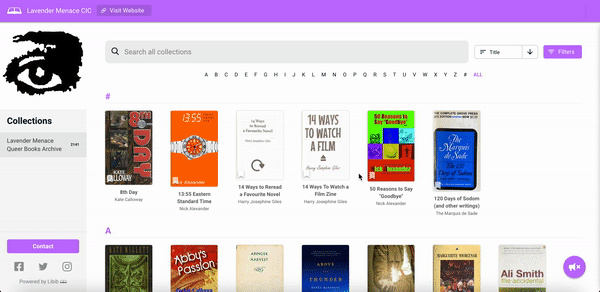
Filtering
Another way to explore the catalogue, particularly if you don’t have a specific book in mind, is to filter through our tags. Currently, we have ten categories of tags.
- Fiction or non-fiction tags
- LGBTQ+ identities (lesbian, gay, bisexual, trans, queer, etc.)
- Genre (historical fiction, crime and mystery, romance, etc.)
- Form: (novel, poetry, anthology, etc.)
- Pulisher (“published by NAIAD press”)
- Location (“shelved as queer plays”)
- Broad topics and themes, such as art and photography, religion etc.
- Specific topics, such as hiv/aids, leather, drag
- Author and subject demographics (black lesbians, chinese author, scottish, etc.)
- Information about the physical book, which mark those that are damaged or those that contains objects and/or inscriptions.
You can combine as many tags as you want in your search. For example, from the filters menu, first add the “authors of colour” tag. If you then add the “feminist” tag, the catalog reduces the number of found records for a more specific list to browse.
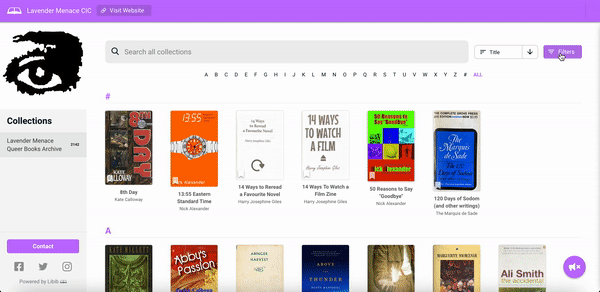
Collections
In the past, we have put together book lists for specific topics, or prepared specific books in preparation for community events. Subscribe to our newsletter and follow our blog to learn more about these collections. You can check out some examples below.
- ShaperCaper UK Nightclub collection
- HIV/AIDS Collection
- Butch Collection
